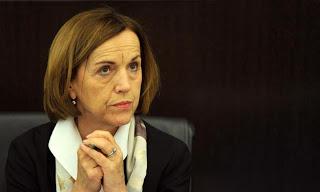In un passaggio del nuovo libro di Vespa la Fornero è parsa più preoccupata dell'abito da mettere non tenendo conto dei problemi del monaco che avrebbe dovuto affrontare da li in avanti.

Già, è uscito il nuovo libro di Bruno Vespa, Il Palazzo e la piazza. Crisi, consenso e protesta da Mussolini a Beppe Grillo - che a leggere così, parrebbe anche una cosa seria. Sembra che ci sia una parte, tra le tante, dedicata alla Fornero: si parla della sera in cui è stata chiamata dall'amico Mario Monti per diventare ministro del Lavoro, e della mattina dopo, quando, dopo aver prenotato il volo per Roma, è stata assalita dalla domanda delle domande. No, non si è chiesta "sarò davvero in grado?". Peggio, molto peggio. "Stavo scegliendo un tailleur-pantalone nero per la cerimonia al Quirinale, quando mi telefonò Lucia Annunziata (...): 'Ricordi che questo giorno è per sempre' mi disse. 'Scelga l'abito che le piace di più'." E chi non è donna non può capire: il domandone, "Che mi metto?", è un qualcosa che può non farti dormire la notte, un qualcosa di esistenziale, di viscerale. Un qualcosa che già è tanto che la Fornero dopo la telefonata, in preda all'isteria, non si sia precipitata al centro commerciale più vicino perché, come tutte, non aveva 'niente da mettersi'. Eppure sembrerebbe che lei, fiduciosa, si sia affidata per la scelta alla sua colf rumena di 27 anni: "'Qual è l'abito che ti piace di più?' le chiesi. [...] Pensai che se piaceva a una ragazza, doveva piacere a tutti."
Forse alla Fornero quel giorno sembrava tutto in discesa, o quantomeno tutto più facile. Forse la via che stava per intraprendere le appariva (solo) tremendamente stimolante e carica di aspettative. Carica anche di responsabilità, certo: ma in una luce tutta propositiva. Perché, pensava, se riesco a piacere ai ragazzi, dovrò - fuor di metafora - piacere a tutti.
Eppure premendo il tasto forward fino ad oggi, l' immagine che ci appare è molto diversa. E dovevamo capirlo già dal primo pianto non controllato: la situazione che si è trovata davanti non era né facile, né in discesa, e se n'è accorta subito. Tanto che piacere ai ragazzi, ora come ora, le interessa poco. Anzi, non perde occasione, con numerosi scivoloni, per avvilire gli spiriti già fiaccati di una generazione che esce ogni giorno di casa con le spanne aperte e tese, in attesa di una manna dal cielo che non arriva. Generazione che, paradosso, proprio da lei pende (sbagliando) per capire da dove iniziare per costruirsi il futuro.
E di questa dimensione, quasi mistica, il ministro Fornero non ha ancora la piena coscienza: "Se ci siete voi dovrò pensare a ogni parola", ha detto ai giornalisti lo scorso 5 Novembre, tentando di cacciarli dalla sala in cui interveniva a Torino, "una persona parla per quaranta minuti, dicendo cose pacate e sensate, ma poi una semplice battuta diventa il titolo dei giornali e solleva polemiche che vanno avanti per settimane." E' chiaro che sta perdendo, e in maniera preoccupante, il contatto con la realtà. Con buona pace di tuttiquelliche:"Un politico deve stare molto attento alla comunicazione, ma è anche vero che il minimo errore non ti viene perdonato" che si leggono in giro negli ultimi giorni: un'affermazione del genere, proferita da quelle labbra, non solo è piagnucolosa, non solo è paradossale, ma è - udite udite - addirittura inaccettabile.
Mills sosteneva che sarebbe "realistico da un punto di vista sociologico, moralmente giusto, e politicamente indispensabile esigere molto dagli uomini di potere, e attribuire loro la responsabilità del corso di specifici eventi." Rimaniamo, per non spingerci troppo oltre, sul 'politicamente indispensabile'. Parliamo di un governo tecnico. Un governo di emergenza, di expertise, che non abbiamo scelto, non abbiamo messo in discussione: calato, dall'alto, per la nostra salvezza. E' chiaro che il ruolo ricoperto da chi ha potere, in questo momento storico, assume una valenza enorme. Forse non ce n'è la completa percezione, ma la responsabilità relativa al discorso 'lavoro' in Italia ha dimensioni non del tutto misurabili: al di là dei provvedimenti presi (di cui non si parlerà in questa sede), il feedback che si riceve dall'altro lato della barricata è un misto di speranza, rabbia, lotta, immaturità; un mix non certo facile da gestire, e un peso notevole, sia umano che politico. Che, però, la Fornero si è caricata in piena libertà di intendere e di volere.
La presenza dei giornalisti all'incontro dell'Unione Industriale del 5 Novembre, nonostante il tentativo di "porte chiuse", si deve ad un cronista, che a nome di tutti si è alzato in piedi e ha detto: " Non ce ne andiamo, perché noi, come voi, stiamo facendo il nostro lavoro e abbiamo il diritto di farlo ". Ogni tanto c'è bisogno di specificarlo. Perché per la maggior parte di noi tornare in redazione con il block notes bianco è un po' come tornare a casa la sera, dai campi, con la cesta vuota: hai buttato un giorno di lavoro, e nessuno ti pagherà.
Carol Verde | @car0lverde
Political communication: Fornero's responsibilities
In a passage of Vespa's new book Fornero has appeared more worried by the dress to wear, not taking into account the problems of the mon that she would have to face from that point on.
Yes, Vespa's new book is out, "The Palace and the square". Crisis, consent and protest from Mussolini to Beppe Grillo. Which, reading it this way, would seem something serious. It seems that there's a part, among many, dedicated to Fornero, about the night she was called by her friend Mario Monti to become Minister of Welfare, and the morning after, when - after booking the flight to Rome - she was struck by the question of questions. No, she didn't ask herself whether she would be capable. Worse, much worse. "I was choosing a black tailleur for the cerimony at the Quirinale, when Lucia Annunciata called. 'Remember that this day is forever. Choose the clothes you like most'." Who isn't a woman cannot understand. The question "what am I going to wear?" is something that can prevent you from sleeping at night, something existential, deep inside. Something that it's already important that Fornero after the phone call, histerical, didn't go to the nearest shopping center because, like all women, had "nothing to wear". It would seem that she relied for the choice on her 27 year old Romanian servant: "What is the dress you like most?" I asked her. I thought that if a girl liked it, everybody would like it."
Perhaps Fornero that day saw everything downhill, or easier. Perhaps the road she was about to start on appeared just incredibly stimulating and filled with hopes. Also filled with responsibilities, of course: but in a positive light. Because, she though, if I can manage to be liked by young people, then i will be liked by everyone.
But if we push the fast forward button until today, the image we see is very different. And we should have understood it from the first uncontrolled cry. The situation she found in front of her was not easy, nor downhill, and she realized that immediately. So much that being liked by young people, now, is of little interest to her. Actually she misses no occasion, with numerous gaffes, to offend the already weak spirits of a generation that goes out the door every day with open hands, waiting for grace from the sky that never comes. Generation that, paradoxally, relies on her (mistake) to understand where to start its future.
And of this dimentions, almost mystical, minister Fornero still doesn't have full consciousness: "If you're here I'll have to weigh each word" she told journalists last November the 5th, trying to get them out of the room in which she spoke in Turin, "someone talks for 40 minutes, saying calm and sensible things, and then a simple joke becomes the title of newspapers and creates useless discussions that go on for weeks". It's clear that she's losing, in a worrying manner, the contact with reality. In spite of those who say that "A politician must be very careful with communication, but it's true that the minimal error is not forgiven" that you can read all over during the last fe days: such a statement from those lips isn't just whining, not only paradoxal, but simply unacceptable.
Mills stated that it would be "realistic from a sociological point of view, morally right, and politically indispensable to ask much from men and women of power, and give them the responsibility of the course of specific events". Let's remain, in order to not go too far, on the "politically indispensable". We're talking about a technical government. An emergency, expertise government, which we haven't chose, we haven't discussed about: it was imposed from above for our salvation. It's clear that the role covered by who has power, in this historical moment, has an enormous value. Perhaps there is no complete perception of this, but the responsibility relative to the "work" matter in Italy has dimensions that aren't fully measurable: beyond the things that have been done, the feedbacl received from the other side of the wall is a mixture of hope, anger, fight, immaturity: a mix that is certainly not easy to manage, and a noticeable weight, bot from a human and a political point of view. Which Fornero has freely decided to take on herself, though.
The presence of journalists at the meeting of the Industrial Union on November the 5th, in spite of the attempt to make it "closed doors", is thanks to a journalist who in the name of all has stood up and said: "We're not leaving because we, as you, are doing are jobs and we have the right to do it". Every now and then we need to specify it. Because for most of us coming back to the redaction with an empty block notes is a bit like coming back in the evening from the land with an empty basket: you've thrown away a day of work, and nobody will pay you.




